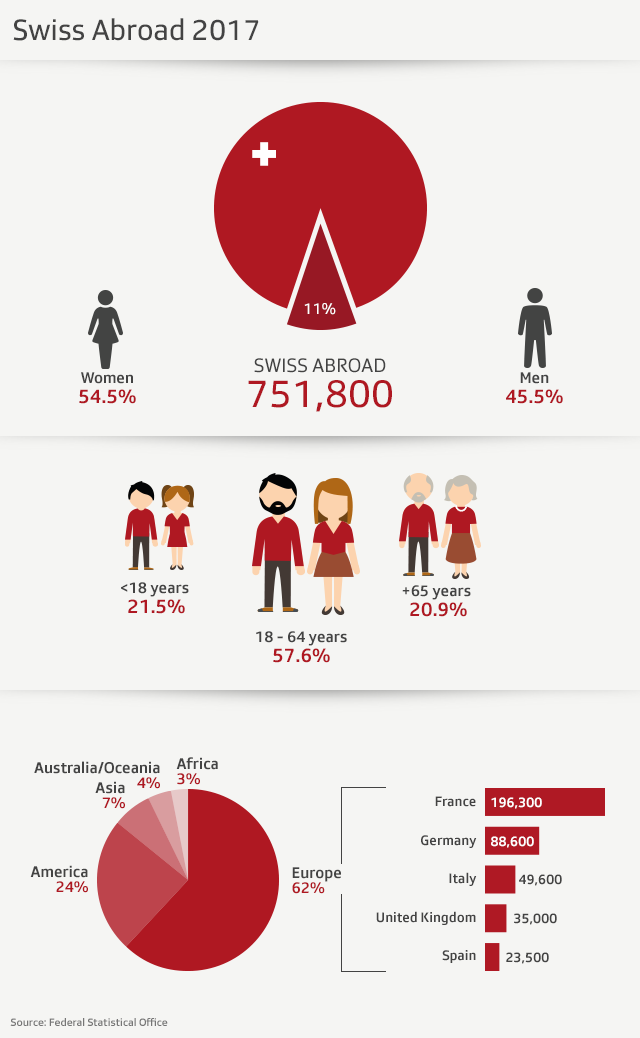
Expat Swiss push for e-voting despite reluctance at home

The expat Swiss assembly is putting pressure on the government and parliament to ensure that e-voting is in place for all Swiss citizens living abroad by 2021.
Delegates of the Council of the Swiss Abroad meeting in the town of Visp on Friday, approved plans to launch an online petitionExternal link calling for the introduction of e-voting over the next three years.
“It’s in your hands now,” Remo Gysin, president of the Organisation of the Swiss Abroad (OSA) commented the result.
Currently, more than 172,000 Swiss abroad have registered to take part in votes and elections in Switzerland. In total, the Swiss abroad community has just over 751,000 members.
The OSA hopes that at least 10,000 people will sign the petition over the next three months.
“We want to give a clear signal against the growing trend in parliament against e-voting,” OSA director Ariane Rustichelli told the assembly.
Hans-Georg Bosch, delegate from South Africa, said e-voting was often the only possibility to exercise political rights. The ballot papers often arrive too late to take part in votes and elections – the tools of the Swiss system of direct democracy.
Critics have repeatedly warned of security flaws of e-voting. Plans are afoot to launch an initiative aimed at banning e-voting that would permanently block plans by the government to introduce it. More than 200 trials have been carried out at national and cantonal levels over the past 15 years.
Last year, the government decided to expand e-voting options across the country, incorporating it in at least 18 of the country’s 26 cantons by October 2019 for the forthcoming parliamentary elections.

Negotiations with banks
Filippo Lombardi, senator and vice-president of the OSA, looked back on the activities in parliament about the recurring topic of access to banking service for Swiss citizens abroad.
He recalled the efforts to legislate on guaranteed services for the expat communities which has been subject to increasingly restrictive policy by the banks over the past ten years amid international pressure to crack down on tax evasion.
Lombardi highlighted a deal between the OSA and the Geneva Cantonal Bank concluded earlier this year.
The 140-member assembly is part of the Swiss Abroad Organisation (OSA) and meets twice a year.
It is made up of representatives of Swiss clubs and associations abroad and of members of domestic institutions, including swissinfo.ch.
The assembly presents the interests of Swiss expatriates before the authorities and public opinion in Switzerland.
“There are no easy solutions,” he warned the assembly. Lombardi said the OSA would continue discussions with the banks and the banking ombudsman to improve the situation for expat clients.
He pledged to report on the discussions within the next 12 months. However, he said further parliamentary moves were not on the agenda for the time being.
OSA President Gysin described the current situation as “unsatisfactory”. He said it was too early to draw conclusions about the deal with the Geneva Cantonal Bank.
He called on expatriate Swiss citizens to inform the OSA about possible problems. He said there were cases of persistent difficulties for Swiss clients living the United States and Canada.
+ More details in the interview with OSA President Gysin
Memorial plans
The assembly also approved a proposal to launch a project for a memorial for expat Swiss victims of the Nazi Holocaust during the Second World War.
An overwhelming majority of delegates gave the green light for the OSA to begin discussions with all parties concerned, including Jewish organisations, the Swiss Red Cross and the foreign ministry.
“The victims of the Holocaust must not be forgotten,” said Gysin. A memorial – possibly in the shape of commemorative plaque in a public place – could help raise awareness of a dark chapter of history, he added.
Gysin referred to two historians, quoted in the German-language Beobachter magazineExternal link last December, and a book by former OSA director Ruedi Wyder.
They drew attention to the fate of Swiss expats living notably in France, Germany, Belgium and the Baltic states during the Nazi era.
About 1,000 citizens of neutral Switzerland were arrested and deported to Nazi labour camps. It is known that more than 200 of them were killed according to records in the Federal Archives.
The total number of Swiss victims is believed to be higher. However, there is no systematic research to date about it.
Historian Christina Späti from the University of Fribourg is currently preparing a larger research project for a systematic overview from diverse sources, and possibly set up a database with information about the victims.
A book by four journalists is also due to be published shortly on Swiss victims in Nazi labour camps.
“The Swiss Holocaust victims were gradually forgotten. This is really difficult to justify I think,” Späti is quoted in the Universitas science magazine of university.


More
Which issues are important to the Swiss abroad?

In compliance with the JTI standards
More: SWI swissinfo.ch certified by the Journalism Trust Initiative


























You can find an overview of ongoing debates with our journalists here . Please join us!
If you want to start a conversation about a topic raised in this article or want to report factual errors, email us at english@swissinfo.ch.